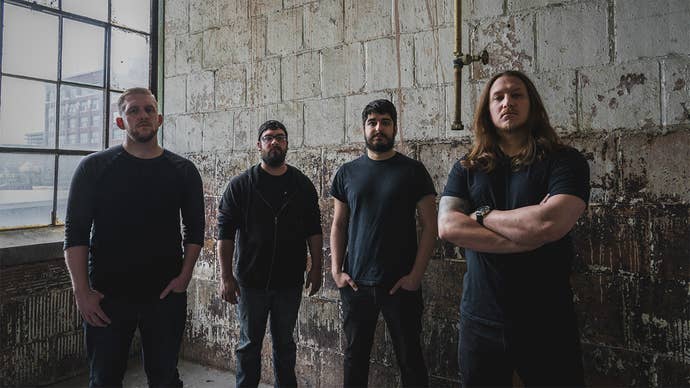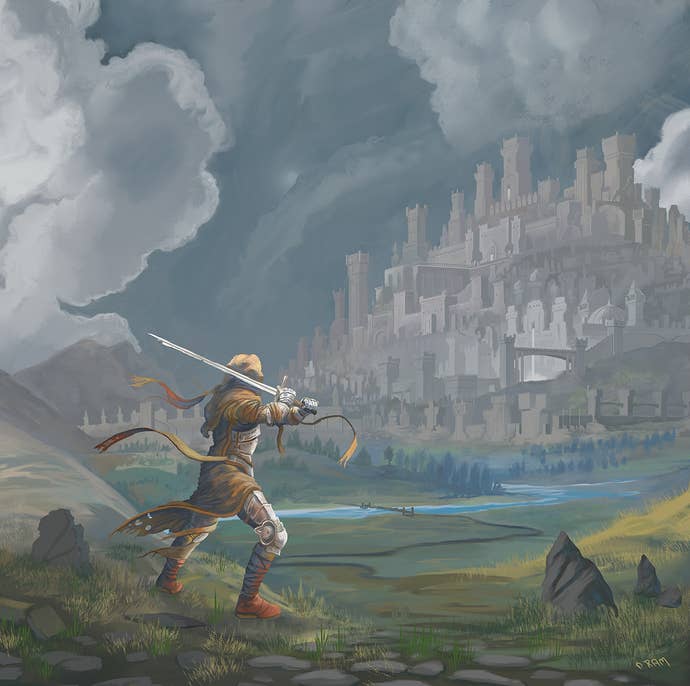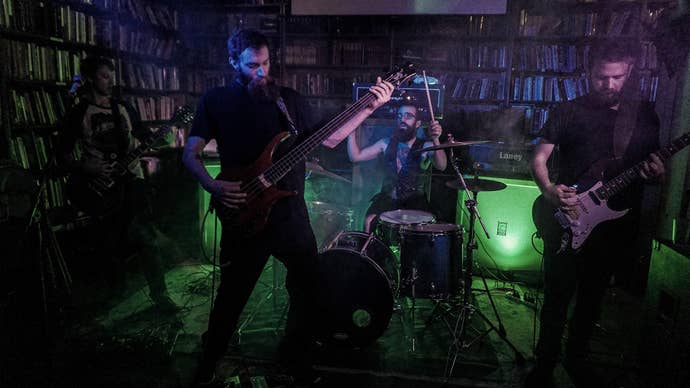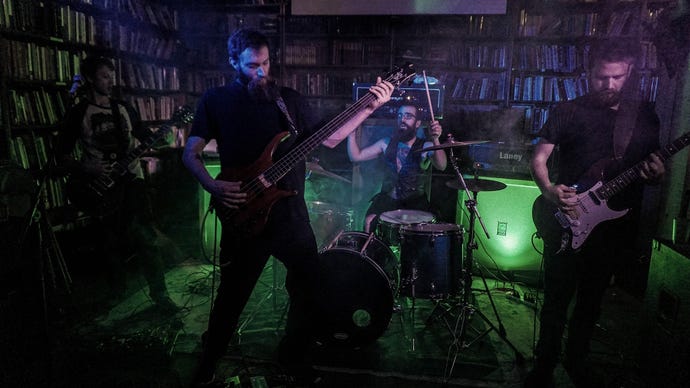How Dark Souls Inspired a New Generation of Metal Bands
FromSoftware's groundbreaking action games have also served as the foundation for several metal bands. We met some of them.
This article first appeared on USgamer, a partner publication of VG247. Some content, such as this article, has been migrated to VG247 for posterity after USgamer's closure - but it has not been edited or further vetted by the VG247 team.
Rock and metal bands have used fantastical worlds to inform their music for decades. The world of Middle-earth, for example, has been mined for artistic inspiration from as far back as the classic rock era, most notably by Led Zeppelin and Black Sabbath.
The website Metal Archives, which catalogues heavy metal bands, lists over 210 bands as having "Tolkien" inspired lyrical themes. That's a lot, even if it's still less than half of the number of bands inspired by H.P Lovecraft (461). However, another influence is emerging for some metal bands: Dark Souls.
Bands like Tomb Mold, Soulmass, Green Druid, Firelink and Hath express their passion for FromSoftware's hardcore action-RPGs through hard-hitting metal music. Taken at face value, it can seem like a gimmick: many of these bands have album and song names lifted directly from the games, as well as some artwork inspired by the series' imagery.
However, every band USgamer interviewed for this piece was massively enthusiastic about the games and their music, praising the work done by other Souls-inspired bands in the process. For all of them, it's so much more than just a gimmick.
Tomb Mold
Derrick Vella, a 31-year-old Ontario native, plays guitar for the band Tomb Mold, which he founded alongside drummer, vocalist and co-lyricist Max Klebanoff. Tomb Mold has put out music at a breakneck pace: they group has released three albums and four tapes since 2015, alongside bassist Steve Musgrave and guitarist Payson Power.
The band's early releases, notably The Bottomless Perdition and Primordial Malignity, explicitly reference FromSoftware games with track titles like "Clockwise Metamorphosis", a passive bonus from Bloodborne, and songs like "Intro / Demon Ruins".
A moody synth intro sets the scene for five straight minutes of brutal yet catchy guitar hooks as Klebanoff's cavernous vocals recount the story of Izalith from Dark Souls:
Banish this insect humanoid / You will be king / Free the fading city
For Vella, using the Souls series as inspiration was similar to other bands using the work of H.P. Lovecraft as a jumping-off point. "Dark Souls and Bloodborne was just like a great visual and atmospheric element to help me to start writing lyrics and music," says Vella over Skype, who had never written a death metal song before Tomb Mold.
He cites the blood-addicted citizens of Yharnam in Bloodborne, making him think about irresponsible pharmaceutical companies, and the series' themes of growth through destruction as inspirations for lyric writing.
Vella started playing guitar at 10 and has an infectious passion for music and video games. He describes his favorite metal albums as an "enriching" and "immersive" experience, similar to Dark Souls and Bloodborne. As a result, Tomb Mold's connection to video games has remained strong: Darkest Dungeon and Dead Space were among aesthetic inspirations for the groups subsequent releases.
Ultimately, he describes death metal as bleak and isolating, qualities that he also finds in FromSoftware's games.
"There's just something real about it" he says.

Hath
The story of Gwyn, Lord of Sunlight, and his deific children is one of the most affecting in Dark Souls lore, and there's something electrifying about hearing their story told over an eight-minute death metal track. "Progeny", by the New Jersey band Hath, contorts and shifts between complex riffs to tell this story, ending with a torrent of drum beats over dramatic guitar chords as guitarist and lead vocalist Frank Albanese yells:
Father I stand the lone god among us/ I will remain your darkening son/ Hiding behind your grand illusion/ Their prayers will all fail when I'm finally lost.
Progeny is the last track from the band's debut album Of Rot and Ruin. Albanese has been playing video games for as long as he can remember and describes himself as a huge FromSoftware fan: he's played each game they've developed since he first beat Bloodborne.
Albanese formed Ophidius, an instrumental metal band inspired by The Elder Scrolls games, before creating Hath with two of its members, drummer AJ Viana and guitarist Peter Brown, alongside bassist Greg Nottis.
His Dark Souls influence "came out on paper" when Albanese wrote lyrics for Of Rot and Ruin, estimating that five out of nine tracks were directly inspired by the series. Some of the songs are based on Frank's personal theories on non-concrete lore, whereas "To Atone" was written in a 30-minute studio flurry about Gwyn: "I think it sounds badass" he says over Skype.
For Albanese, the draw of Souls series is its ambiguous world-building and complex morality. "There's a lot of personal issues with these characters, these people in the lore, that ends up steering the history of a whole land," Albanese says. "The sound [of Hath] kinda made me think of the games; it had a dark, intense vibe."
Overall, the games have had a "genuinely huge" impact on Albanese. "When I was playing through those games, I want to say 2015 to 2018, were kind of a hard time for me, there was just a lot of stuff going on that wasn't great. In the games, it was kind of an escape... I could separate that from real life and it was something that I could affect, something that I could overcome."
Soulmass
The Souls community is known for obsessing over the world's lore and history, with YouTubers like VaatiVidya taking advantage of the series' sparse environmental storytelling to craft grand narratives. Bryan Edwards goes further than this. The 35-year-old vocalist for the extreme metal band Soulmass produces in-depth videos analysing the links between Dark Souls and real-world mythology, titled "Dark Souls: A New Mythology."
"I've always been extremely interested in mythology, history and archetype symbolism, so coming into Dark Souls... I (looked) for those kinds of connections," Edwards says over Skype.
Soulmass blends the extreme sub-genres of death metal ("heavy, harsh, dark, killing things") and doom metal ("esoteric and mysterious") to convey the highs and lows of playing Dark Souls, which can be heard on its second album The Weakness of Virtue (2019). Overall, Bryan thinks that Dark Souls is particularly suited to metal music.
"It's an environment that's very oppressive. It's lore that's very dark and dreary, and there's not a lot of happy stuff in it," Edwards says.
Multi-instrumentalist and fellow FromSoft fan Brett Windnagle formed Kingdoms of Flesh, a Souls-inspired metal project, alongside Edwards. This eventually morphed into Soulmass, incorporating bassist Aaron Sluss and drummer Stephen Scudero.
Their songs dive deep into the game's lore, focusing on specific characters like Solaire or Steady Hand McDuff, as well as musing on the game's overarching themes.
"I really like the comfort of having a concept and a world to stay within so I can keep everything together. It helps me keep my lyrics all very connected; I like telling a story across [an] album," Edwards says.
Edwards develops lyrics after a song has been fully written in order to match his storytelling to the emotions conveyed by the music. For example, "Spear and Hammer" is about fighting the infamously difficult bosses Ornstein and Smough. The song is hyper-aggressive, mimicking the fast-paced onslaught of Ornstein in the first half, before slowing down to a crushing breakdown in the outro, evoking the mountainous Smough. It even references the game's dodge-rolling mechanics:
Fight for your life/ Face the onslaught to ascend/ Run, dodge, and roll/ Seize opportunity or die
"For me, Dark Souls is almost like therapy. I struggle with depression, anxiety, and Dark Souls gives me a place where I can face challenges and overcome them," Edwards says.

Firelink
Every person we interviewed reminisced fondly about their introduction to FromSoft games and vividly described the emotions that the games evoked in them. But for the extreme metal duo Firelink, this epic and emotional experience of playing Dark Souls is "what drives all the music that Firelink does," according to guitarist Harrison Stivarius.
For example, the track "Manus" is "really f*cking hard-hitting" to represent the character's descent into the abyss, while "Kindled" is written as a triumphant song to represent the player's increased mastery of the game. The closing track "The First Sin" is inspired by the feeling of finally beating the game:
Fire cracks the sky/ Ending the circle of existence/ Purging fire across this land, to kindle our own souls
"You're just kinda awe-struck by what you've just experienced... where did these last four months go?" vocalist Adrian Davis laughs.
Stivarius and Davis both live in Atlanta and have known each other for about four years. Davis started playing guitar in fifth grade, but focused on harsh vocals after he first got into metal music. Harrison, meanwhile, has 15 years of experience with guitar, having played cello through high school.
The pair first worked together musically on Valak, a band centered around hyper-aggressive guitar shredding and relentless vocals. For both, it was their first serious band. The idea for Firelink came out of a jam session that turned into the song "Kindled".
"When we started writing The Inveterate Fire, we knew this was gonna be a Dark Souls album" Davis says.
The duo's second album, which incorporates drummer Kevin Paradis and is scheduled to be released around June, will consist of five tracks conceptually based around the five Lords of Dark Souls-epic boss battles that bookmark sections of the world. For the follow-up, the pair did more in-depth research into the game's lore, taking notes about how the levels and boss fights made them feel and putting that directly into the music.
"Dark Souls was the perfect format to coincide with what I was feeling: it enhances it. The music that I wanted to write all along gives me a similar feeling that Dark Souls did" Stivarius says.

Green Druid
The atmosphere of FromSoftware games are a huge part of their appeal, whether it's the melancholic high-fantasy of Dark Souls or the grimy streets of Bloodborne. The fantasy-horror aesthetic is "probably one of the main reasons that (the games) are so appealing to heavy musicians: it's just a goldmine," says Graham Zander, a guitarist for the doom metal band Green Druid.
Zander was joined by bassist Ryan Skates and vocalist and guitarist Chris McLaughlin for a Zoom call. Green Druid is a Denver-based metal band, mixing the slow intensity of doom metal with the sludgy riffs of stoner rock.
Zander and McLaughlin started the band in 2014. "It was just us smoking weed and jamming to (doom metal) in the basement" Graham said.
The group's first album, Ashen Blood, is a 74-minute odyssey partially inspired by FromSoftware games. They've been friends since high school and all listened to pop-punk music like Green Day growing up before gravitating towards more intense bands like Nirvana and Black Sabbath. "We all kinda took a pretty similar musical ascendance," Skates says.
Ashen Blood was written collectively, with songs often coming from trial-and-error jam sessions, and the atmosphere of Bloodborne had a tangible influence on the music.
For example, "Cursed Blood" consists of a single repeating riff that mimics the player's descent into Bloodborne's chalice dungeons, whilst the band's use of dynamics (i.e loud versus quiet) evokes the flow of the games, where you might be appreciating a beautiful vista one minute and getting bashed around the next. Additionally, the track "Pale Blood Sky" was "ripped pretty much directly from Bloodborne," according to McLaughlin. It's somewhat hypnotic, drawing the listener in with an ominous and slow-paced guitar riff before McLaughlin's mournful vocals kick in:
Pray / to gods that hate the living, tell the children good night/ The dark ones come when they get hungry/ Spread / your wings and feel the bite
McLauglin' lyrics-also inspired by writers like Lovecraft, horror films and bad drug trips-are intentionally ambiguous, with certain tracks on Ashen Blood being completely unrelated from the Soulsborne universe. However, McLaughlin is happy being associated with the games, which he considers to be significant artistic works.
"The games have done so much for so many people that I think it's a major compliment," Skates says.
Each member describes the games as a therapeutic experience. For McLaughlin, overcoming the hardcore challenges of Dark Souls was similar to dealing with depression. "You just spend days, sometimes weeks, in these states of, 'I don't know how I'm gonna do this, I don't know how I'm gonna get over this' and it's just like, a little bit at a time, you learn to get a little bit better at it.
"It's always going to be there... but you can push through and get to these high points," says McLaughlin. "Because of the depression, your high points are that much higher because you know how bad it can get. [In Dark Souls] When you do beat that boss, it's just thrilling, euphoric."
Not Just a Gimmick
Chatting to these bands makes it abundantly clear that the Souls theme is not a gimmick. These are passionate and enthusiastic musicians pouring their love for a treasured game into their work, blatantly or otherwise. However, USG wouldn't have even heard of some of these bands if not for their "Dark Souls" label, so we asked them to discuss this association.
For Firelink, metal and Dark Souls simply go hand in hand, with guitarist Harrison Stivarius saying "Dark Souls just fits it perfectly, it really does."
Soulmass are similarly enthusiastic. "To see people come out and say, 'Hey, I really like this song, I really connect with these specific lyrics, I love that lore, thank you for doing this.' That's really enriching," vocalist Bryan Edwards says.
However, Green Druid and Hath are moving away from the Soulsborne universe in their future releases, both keen to spread their wings, while Derrick Vella from Tomb Mold describes it as "the shadow we'll never get out of".
"Bloodborne is not representative of the entire band... we just want to kind of create our own thing," Vella says, pointing to fans drawing false associations between his lyrics and the games. For instance, some assume that the song "Abysswalker" is a tribute to the fan-favorite Souls characters, when it's actually about Vella's pet rat Artorias, which has sadly passed away.
One way or another, FromSoftware's games have served as a launching pad for all of these groups, driving their individual sounds and lyrics in ways that feel perfect for the metal genre.
Dark Souls has a hardcore reputation. Oceans of ink have been spilled analysing the psychology of the series' difficulty, examining the games in contrast to modern "casual" game design and even arguing against this reputation.
Metal music is similarly abrasive, most notably with the screamed or growled vocals that are prominent in more extreme subgenres. However, these qualities allow for startling moments of contrast. In Dark Souls, it's the silence that falls over a battlefield after you slay a boss; in metal, it's an acoustic guitar cutting into the mix after a howling crescendo.
For many of these bands, the Souls series serves as an escape; sometimes even as a form of therapy. Metal music can be similarly appealing as a departure from mainstream tastes. Vella refers to Tomb Mold's members as nerds and outcasts in an interview on the podcast Fresh Is The Word and reiterates this during our discussion.
"At some point in your life, you realise that you're not satisfied with what's immediately accessible," says Vella, who found refuge in extreme music countercultures. For him, this also applies to video games like Dark Souls that offer rich narrative experiences beyond the mainstream.
It's easier to listen to a pop album than to spin the new Cattle Decapitation record, just like it's easier to tap away at Candy Crush than it is to play Sekiro. Metal music takes some getting used to, just like it takes a while for Dark Souls to sink its hooks in. But in the end, both offer a wealth of riches for those willing to take the plunge.



